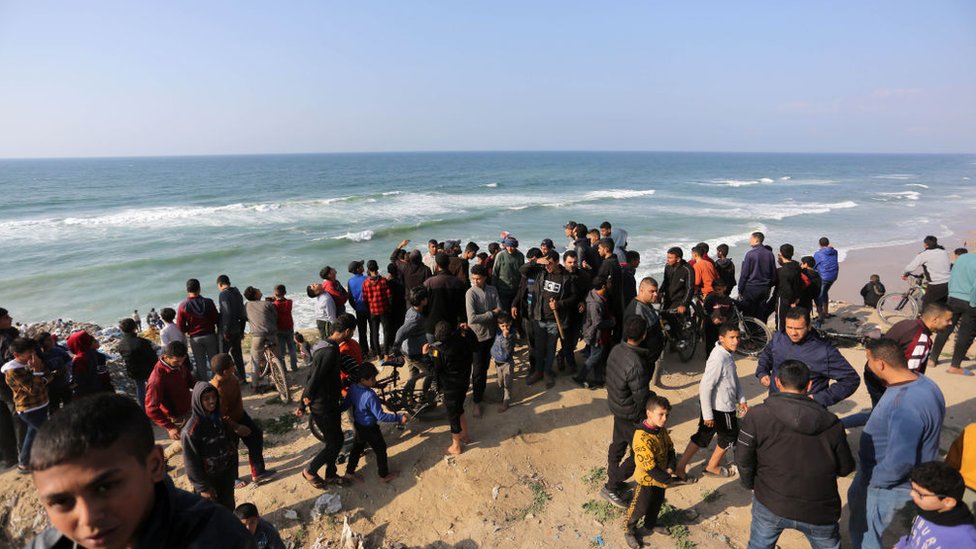Gaza Maritime Corridor,
“US Unveils Proposal for Temporary Gaza Port Amidst Humanitarian Crisis
In a significant move aimed at addressing the escalating humanitarian crisis in Gaza, President Biden announced the United States’ intention to construct a temporary port in the region. This announcement comes on the heels of mounting concerns over the dire situation in Gaza, where a quarter of the population teeters on the brink of famine, according to alarming reports from the United Nations.
The urgency of the situation was underscored by recent tragic events. On Friday, reports emerged of a devastating incident in which five individuals lost their lives during an aid air drop. Eyewitness accounts, corroborated by the Hamas-run health ministry in Gaza and echoed by news outlets such as the BBC’s US partner CBS and the Agence France-Presse (AFP), describe how parachutes failed to deploy properly, resulting in fatal consequences for those on the ground.
The devastating loss of life underscores the gravity of the humanitarian crisis gripping Gaza. The UN has sounded the alarm, warning that children are among the most vulnerable, facing severe malnutrition and starvation. Despite concerted efforts by the international community to provide assistance, aid organizations caution that the scale of need far surpasses available resources.
While the US and other nations have resorted to air drops as a means of delivering vital aid, these efforts are fraught with challenges and limitations. Although intended as a last resort to reach communities in desperate need, air drops often fall short of adequately addressing the soaring demand for essential supplies.
Against this backdrop, the US proposal for a temporary port in Gaza represents a potential lifeline for the beleaguered population. However, significant challenges lie ahead in translating this vision into reality amidst complex geopolitical dynamics and logistical hurdles.
As the world grapples with the unfolding tragedy in Gaza, urgent action is needed to avert further loss of life and alleviate the suffering of those most in need. The international community must rally together to provide sustained support and concrete solutions to address the root causes of the crisis and ensure the delivery of essential aid to Gaza’s vulnerable population.”

European Commission President Ursula von der Leyen expressed grave concern over the humanitarian crisis unfolding in Gaza, highlighting the urgent need for additional aid. Speaking from Cyprus, von der Leyen emphasized the severity of the situation, characterizing Gaza as “facing a humanitarian catastrophe.” She announced plans for a sea corridor to facilitate the delivery of much-needed aid to the region, signaling a collaborative effort involving the European Commission, Cyprus, the US, UK, and UAE.
In a joint statement, the participating nations acknowledged the complexity of operating a sea corridor but reaffirmed their commitment to press Israel to expand aid delivery through existing road routes and crossings. UK Foreign Secretary David Cameron echoed this sentiment, urging Israel to permit more trucks into Gaza as a means to expedite aid distribution.
Israel welcomed the initiative and emphasized its commitment to ensuring that aid is delivered following rigorous security checks conducted in accordance with Israeli standards. However, Jeremy Konyndyk, leader of the aid agency Refugees International, cautioned that while the maritime route is a welcome development, it may not be sufficient to address Gaza’s dire food shortage crisis.
Meanwhile, US President Biden announced plans for the US military to construct a pier to facilitate the transportation of supplies from ships at sea to Gaza’s shores. Biden stressed that this operation, which would not involve US troops on the ground, would significantly increase the volume of aid reaching Gaza. However, he called on Israel to play its part in enabling aid access and ensuring the safety of humanitarian workers.
Despite these efforts, Michael Fakhri, the UN special rapporteur on the right to food, criticized the port plan as “absurd,” suggesting it may be more of a political performance than a substantive solution to Gaza’s crisis.
While aid lorries have been able to access the south of Gaza through existing crossings, the northern region, which bore the brunt of Israeli military operations, has faced significant obstacles to aid delivery in recent months.
